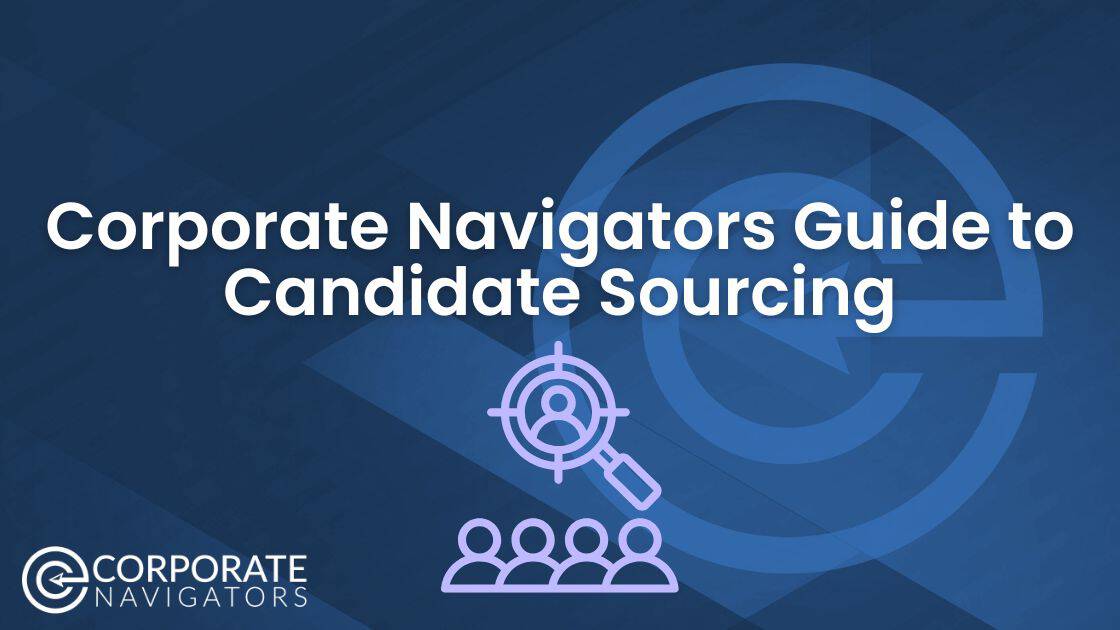
Table of Contents
The Corporate Navigators Guide to Candidate Sourcing
Candidate sourcing is the proactive approach to identifying, attracting, and engaging potential candidates for current and future job openings. Unlike traditional recruiting methods where employers post job listings and wait for applications, candidate sourcing involves actively seeking out qualified individuals who may not be actively looking for new opportunities. By extending the search to passive candidate pools, recruiters can discover more qualified choices for their clients.
The process of candidate sourcing typically includes:
- Understanding job requirements and creating a sourcing strategy.
- Searching for potential candidates using various channels, such as job boards, social media networks, and professional forums.
- Collecting candidate information and creating comprehensive professional profiles.
- Initiating contact and engaging with potential candidates to gauge their interest.
- Pre-screening candidates to verify qualifications before moving them to the next stage of recruitment.
It’s important to note that sourcing is just one part of the broader recruitment process. While a candidate sourcer focuses on building a robust pipeline of potential candidates, it is up to the employer to determine how the entire recruitment lifecycle is managed. For example, they may outsource the entire process of identifying, screening, interviewing, and onboarding to an RPO firm. Or, they may hire Corporate Navigators for Candidate Sourcing exclusively and handle the interviews, and onboarding in-house.
Candidate sourcing typically involves five tasks:
- Researching potential candidates from various platforms (LinkedIn, job boards, databases, etc.)
- Screening and shortlisting to find candidates who match the job requirements.
- Networking through industry events, referrals, or social media.
- Active outreach to engage with candidates through emails, calls, or messages.
- Building relationships with passive candidates (those who aren’t actively job hunting but may be interested in future opportunities).
Ultimately, candidate sourcing helps recruiters identify a diverse range of candidates, speed up the hiring process, and often results in better quality hires.
Why is Candidate Sourcing Important?
Candidate sourcing is important because it gives an employer access to the most choices among qualified talent. Instead of relying on resumes and potentially outdated candidate profiles in the public domain, companies can receive data on passive candidates that meet their ideal candidate requirements. Here are some typical benefits linked to talent sourcing:
- Reduces Time-to-Hire: A well-maintained talent pipeline ensures positions are filled faster, decreasing time-to-fill.
- Improves Candidate Quality: Proactive sourcing allows recruiters to find highly skilled candidates who might not apply on their own.
- Gives a Competitive Advantage: Companies that source talent effectively are better positioned to hire top performers before competitors.
When is candidate sourcing useful for organizations?
Sourcing candidates is beneficial in the recruitment process for many reasons. Here are some ways that ordering candidate sourcing from Corporate Navigators can help.
1. Recruiters and Talent Acquisition Teams:
- Increased Efficiency: By proactively identifying candidates before a job opening is posted, candidate sourcing helps recruiters build a strong talent pool. This speeds up the hiring process when a position opens.
- Quality Candidates: Sourcing allows recruiters to find passive candidates, which are currently employed people who aren’t actively looking for a role. These individuals often have proven skill sets and are currently in roles that fit the open position’s job description.
- Diverse Talent Pipeline: Sourcing is an effective strategy to tap into a more diverse range of candidates, helping companies improve diversity and inclusion. If one’s company culture is passionate about diversity, then this is a benefit that furthers the company’s mission and makes a strong employer brand.
2. Hiring Managers:
- Access to Better Candidates: Sourcing ensures hiring managers are presented with a curated list of qualified candidates, reducing the time spent reviewing unqualified applications.
- Faster Hiring Process: With candidates already identified and engaged, hiring managers can fill positions more quickly, reducing the risk of team disruption.
3. Companies and Organizations:
- Competitive Advantage: Proactively sourcing talent allows companies to stay ahead of competitors who might only be reactive in their hiring. This is especially important in industries with a high demand for skilled talent.
- Cost-Effectiveness: Candidate sourcing as an on-demand service can save companies money if they can interview and onboard candidates in-house. Instead of paying a third party to handle the full cycle of recruitment, investing in the candidate search and outreach alone can save recruitment teams time while managing costs.
- Build a Talent Pool for Future Needs: Companies can maintain a pipeline of talent for upcoming hiring needs, allowing them to be prepared for future growth or changes in workforce requirements.
4. Candidates:
- Opportunities: When recruiters conduct an advanced search for qualified candidates, this process connects passive candidates with new career opportunities that they might not have actively sought. This can open doors to roles they might not have considered or known about.
- Personalized Outreach: When candidates are approached for specific positions, this often means these new job opportunities align closely with their skills, experience, and career goals.
Candidate Sourcing: Your Path to More Qualified Hiring Choices
By implementing effective candidate sourcing strategies, organizations can improve their hiring outcomes and ensure a steady supply of qualified talent for their current and future needs. Overall, it’s particularly advantageous for businesses aiming to optimize their recruitment strategies, streamline hiring, and find top talent more effectively.
It’s good for companies looking to stay competitive in talent acquisition, recruiters who want to work efficiently, and candidates who might find career opportunities they otherwise wouldn’t have encountered.


